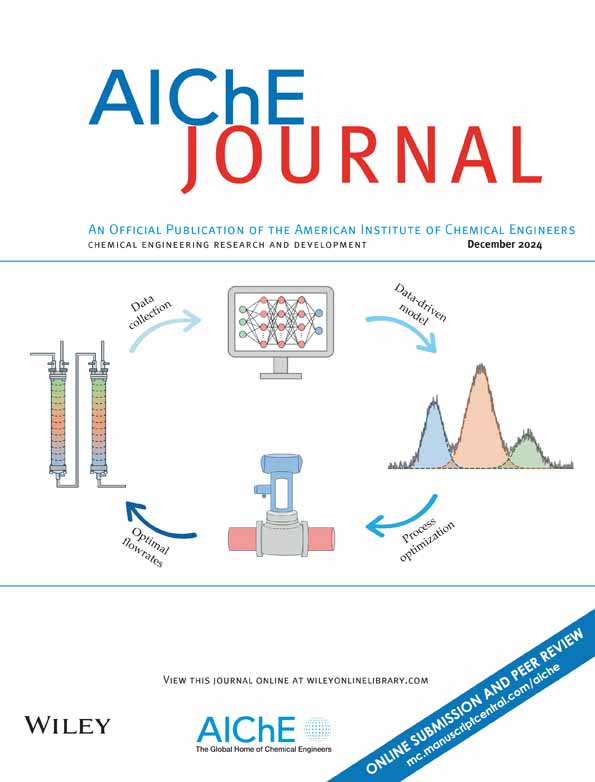Frustrated Lewis pairs constructed on Cs‐Beta for aldol condensation of methyl acetate with formaldehyde
IF 4
3区 工程技术
Q2 ENGINEERING, CHEMICAL
引用次数: 0
Abstract
The solid frustrated Lewis pairs (FLPs) catalyst is a new promising field in catalysis but replete with challenges regarding catalyst preparation and characterization. Herein, a facile acid–base reconstruction strategy is proposed for FLPs catalyst construction based on Beta zeolite. CsCs - β上构建的受挫Lewis对用于醋酸甲酯与甲醛的醛缩反应
固体受挫路易斯对(FLPs)催化剂是催化领域中一个很有前途的新领域,但在催化剂制备和表征方面仍存在诸多挑战。本文提出了一种简便的基于β沸石的FLPs催化剂酸碱重构策略。Cs+首先被水合外框架铝(EFAL) Lewis酸位点诱导形成不稳定的酸碱加合物。然后,Cs+迁移到相邻的Si - OH中,在高温下形成Si - o - Cs路易斯碱,同时再生EFAL路易斯酸中心,建立FLP结构。建立了一种用于表征FLPs的酸碱分子竞争吸附的光谱方法,并通过系统表征在8.1Cs‐Beta‐ex上证实了中等强度的Lewis酸碱对。这种设计的FLPs催化剂在乙酸甲酯和甲醛的醛醇缩合成丙烯酸甲酯方面表现出卓越的协同作用,在约8 wt%的Cs负载下,与传统浸渍催化剂相比,sti的效率提高了5.8倍。
本文章由计算机程序翻译,如有差异,请以英文原文为准。
求助全文
约1分钟内获得全文
求助全文
来源期刊

AIChE Journal
工程技术-工程:化工
CiteScore
7.10
自引率
10.80%
发文量
411
审稿时长
3.6 months
期刊介绍:
The AIChE Journal is the premier research monthly in chemical engineering and related fields. This peer-reviewed and broad-based journal reports on the most important and latest technological advances in core areas of chemical engineering as well as in other relevant engineering disciplines. To keep abreast with the progressive outlook of the profession, the Journal has been expanding the scope of its editorial contents to include such fast developing areas as biotechnology, electrochemical engineering, and environmental engineering.
The AIChE Journal is indeed the global communications vehicle for the world-renowned researchers to exchange top-notch research findings with one another. Subscribing to the AIChE Journal is like having immediate access to nine topical journals in the field.
Articles are categorized according to the following topical areas:
Biomolecular Engineering, Bioengineering, Biochemicals, Biofuels, and Food
Inorganic Materials: Synthesis and Processing
Particle Technology and Fluidization
Process Systems Engineering
Reaction Engineering, Kinetics and Catalysis
Separations: Materials, Devices and Processes
Soft Materials: Synthesis, Processing and Products
Thermodynamics and Molecular-Scale Phenomena
Transport Phenomena and Fluid Mechanics.
 求助内容:
求助内容: 应助结果提醒方式:
应助结果提醒方式:


